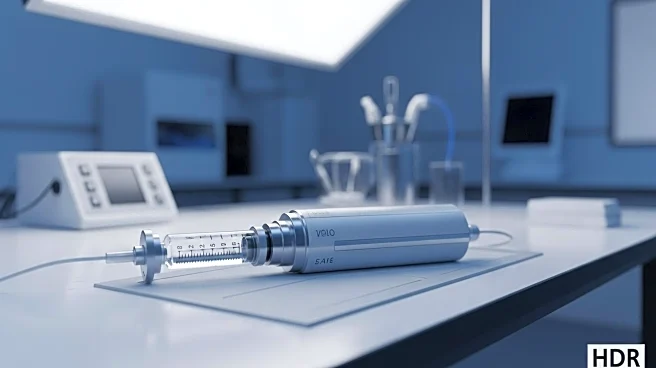What's Happening?
Apiject Systems, Corp. has submitted a New Drug Application (NDA) to the FDA for its innovative prefilled single-dose injection device. The device utilizes Blow-Fill-Seal (BFS) technology, which combines liquid packaging and precision injection molding to create scalable and affordable drug delivery systems. The submission includes the drug Glycopyrrolate, designed for treating peptic ulcers. Apiject's technology aims to reduce costs, complexity, and supply chain risks associated with traditional glass vials and syringes. The company has received support from the U.S. Department of Health and Human Services and private sector investments.
Why It's Important?
Apiject's submission represents a significant advancement in drug delivery technology, offering economic and sustainability benefits over traditional methods. The BFS technology provides a streamlined manufacturing process, reducing foreign dependencies and carbon output. This innovation is crucial for the pharmaceutical industry, as it addresses the growing demand for medical injections and enhances domestic production capabilities. The development aligns with public health goals, ensuring more accessible and affordable drug delivery systems for commercial use, public health campaigns, and emergency response.
What's Next?
Pending FDA approval, Apiject's device could revolutionize drug delivery systems, offering a more efficient and sustainable alternative to glass vials and syringes. The company plans to expand its BFS-based injectable platform in collaboration with Amneal Pharmaceuticals. The approval may lead to increased adoption of BFS technology in various medical applications, including injections, inhalants, and infusions. Stakeholders, including healthcare providers and patients, may benefit from improved access to innovative drug delivery solutions.
Beyond the Headlines
The development of Apiject's device highlights the ethical and cultural dimensions of advancing medical technology. By focusing on sustainability and affordability, the innovation addresses critical public health challenges and promotes equitable access to healthcare. The project reflects a renewed commitment to building domestic pharmaceutical manufacturing capacity, reducing reliance on foreign suppliers, and enhancing national preparedness for health emergencies.









